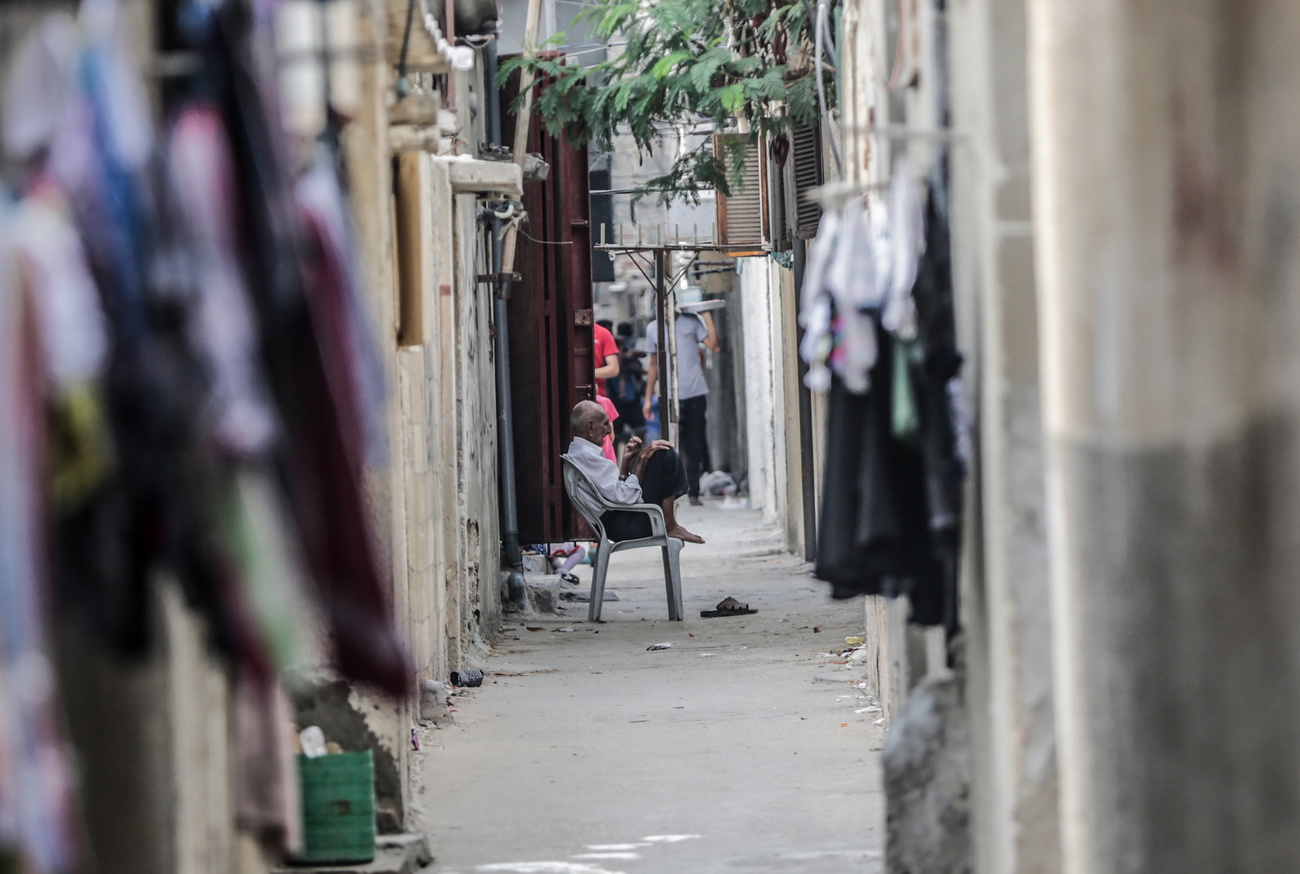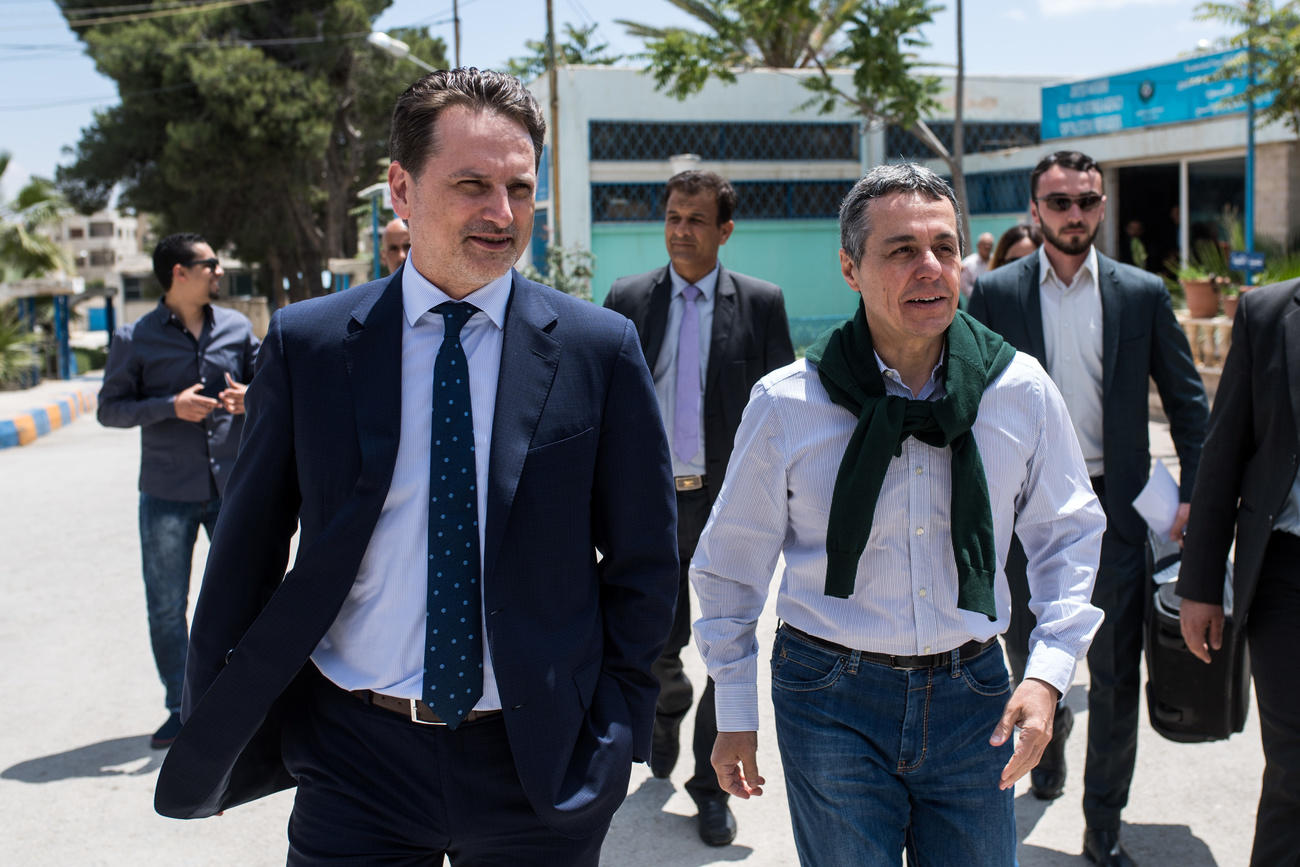
‘We can no longer maintain the status quo,’ says UNRWA head Philippe Lazzarini

The United Nations Relief and Works Agency for Palestine Refugees (UNRWA) is in dire financial straits, and not for the first time. Philippe Lazzarini, head of the agency, blames politics for the lack of funding.
When does an interim solution cease to be interim? For almost 75 years, UNRWA has assisted Palestinian refugees in the Near East and repeatedly faced financial bottlenecks. The situation has progressively worsened since 2010, when several donors started to cut their contributions. The temporary suspension of funds from the United States under former president Donald Trump in 2018 created a gaping hole in UNRWA’s budget, even though his successor, Joe Biden, opted to resume funding.
An important gap now exists between what is expected of the organisation and the funds that are available, says Lazzarini. Raising money for UNRWA, which involves a lot of public-relations work, is high on his priority list. “The growing disparity between expectations and financial means could lead to an implosion of the organisation,” warns Lazzarini.
If the organisation does collapse, it would not come as a surprise. Donor pledges have stagnated for more than a decade – a decade that has seen several crises in the region: the war in Syria; the collapse of Lebanon; the COVID-19 pandemic; and most recently the devastating earthquake and the rise in deadly violent attacks in Israel and Palestine.

More
Swiss pledge CHF40 million to struggling UNRWA
The Palestinian refugees registered with UNRWA have been repeatedly hit by these crises, and UNWRA is often the only organisation that supports them. Without additional funding, however, it is impossible to respond to their growing needs. “We can no longer maintain the status quo,” says Lazzarini.
Helping more refugees on shrinking donations
UNRWA was originally created as a temporary agency to assist Palestinian refugees after 1948. Since then, its mandate has been renewed every three years. It long ago became an institution that provides public-sector-like services, such as medical care, education and humanitarian aid. UNRWA assists 5.6 million registered refugees in Jordan, Syria, Lebanon and the occupied Palestinian territory (OPT) who are in need of humanitarian assistance to varying degrees, depending on the political situation in the region.
Around 550,000 of the refugees are students, while 2 million people are in need of primary health care and food assistance. Most of the agency’s 30,000 employees are Palestinians, which means the organisation not only struggles to continue to assist them, but also to pay their salaries.
Since refugee status is passed down the generations, the number of refugees is constantly growing, and so is the demand on UNRWA, which is funded through voluntary donations. The lion’s share of the funds, which amounted to US$1.6 billion (CHF1.43 billion) in 2022, is provided by Western countries. Switzerland contributes around CHF20 million annually and has done so for years.
The financial contribution from Arab states is comparatively low and has dropped even further in recent years. “There is a discrepancy,” says Lazzarini. “Solidarity with the Palestinians is big, but at the same time, funding has dropped.” This could be testament to the geopolitical shift happening throughout the region. Some Arab states want to improve their relationship with Israel, whereby dwindling support for Palestinian refugees is one of the consequences.
For the refugees who struggle to survive in increasingly difficult conditions, the consequences of this waning commitment are not only financial, says Lazzarini: “People feel more and more forgotten by the international community.” Combined with widespread poverty and the lack of prospects, this is a dangerous mix.
Internal mismanagement
UNRWA itself has received criticism in recent years. It has been accused of internal mismanagement and allowing anti-Semitic content in schoolbooks. After a visit to a refugee camp in Jordan in 2018, Swiss Foreign Minister Ignazio Cassis said that UNRWA had become “part of the problem” – in other words, the agency is an obstacle when it comes to finding a solution to the Palestine issue. This is a narrative that right-wing groups in Israel and the US have backed for some time.
In 2019, Lazzarini’s predecessor, the Swiss diplomat Pierre Krähenbühl, had to resign after he came under heavy criticism for poor management. This resulted in financial bottlenecks as European countries, including Switzerland, suspended their payments.

More
Swiss suspend payments to Palestinian refugee agency
Lazzarini says the criticism has been taken seriously, pointing to the current restructuring measures and greater oversight of content for schoolbooks, which are provided by local authorities of the areas where UNRWA operates. “UNRWA often gets blamed for the problems in the region that can only be solved on a political level,” he adds. “Unfortunately, no political solution has been on the horizon for some time.”
One point that is often criticised is that perpetuating refugee status and committing to repatriation rights makes peace talks impossible. Critical voices say that more should be done to facilitate the integration of the refugees in the countries they live in. “However, the right conditions [to facilitate integration] don’t exist in these countries,” says Lazzarini.
No changes on the horizon
UNRWA will celebrate its 75th anniversary in 2024. After a recent visit to a refugee camp in Beirut, Lazzarini gives an example of how little has changed since UNRWA’s inception. “After three quarters of a century, you are still distributing food,” a young camp resident told him.
Asked what the way forward is, Lazzarini says: “Our goal is clear – we want [to be in] a situation where UNRWA is no longer needed.” But since the agency’s mandate is based on what the UN General Assembly decides, it needs a political process to change the lot of Palestinian refugees. For the time being, he has no other choice than to close the gaps and find ways to maintain UNRWA’s funding in the medium term.
However, until a political solution is found, UNRWA will remain irreplaceable, and according to Lazzarini, all players agree on that. Israel, however, seems to think differently even though Lazzarini describes the relationship with the Israeli authorities as pragmatic and does not think that a collapse of the organisation would be in their interest.
“A lot is happening in the region at the moment,” he says. “We must remain optimistic that a solution can be found – we owe that to the Palestinian refugees.”
Edited by Balz Rigendinger, adapted from German by Billi Bierling/gw

In compliance with the JTI standards
More: SWI swissinfo.ch certified by the Journalism Trust Initiative







































You can find an overview of ongoing debates with our journalists here . Please join us!
If you want to start a conversation about a topic raised in this article or want to report factual errors, email us at english@swissinfo.ch.